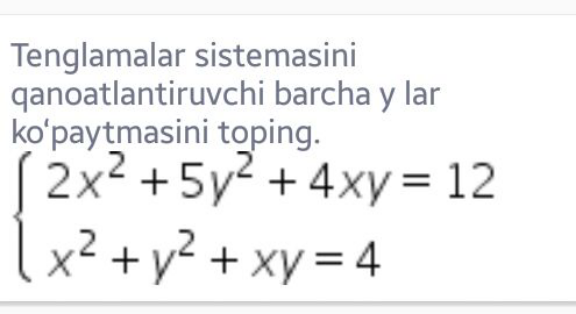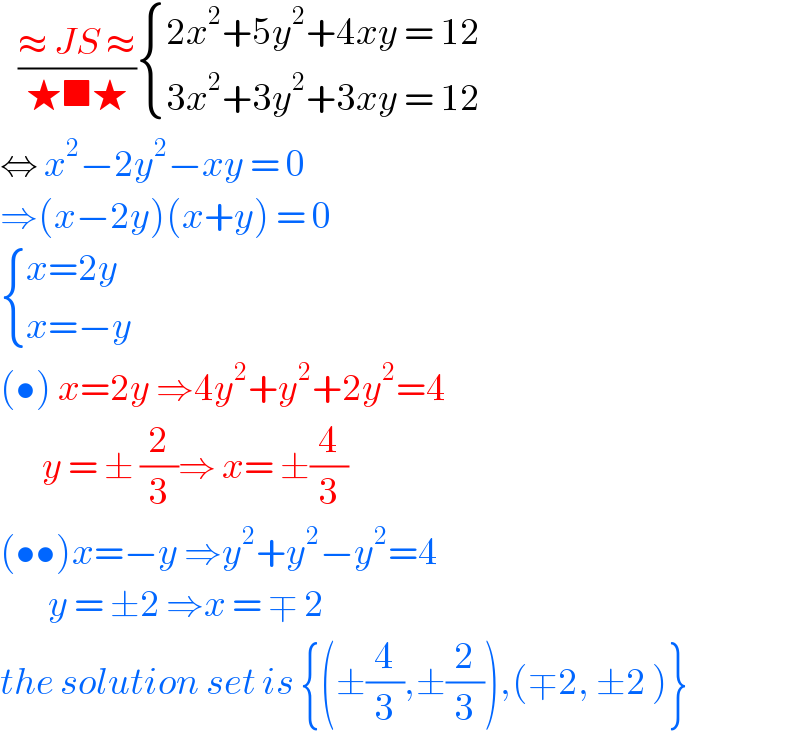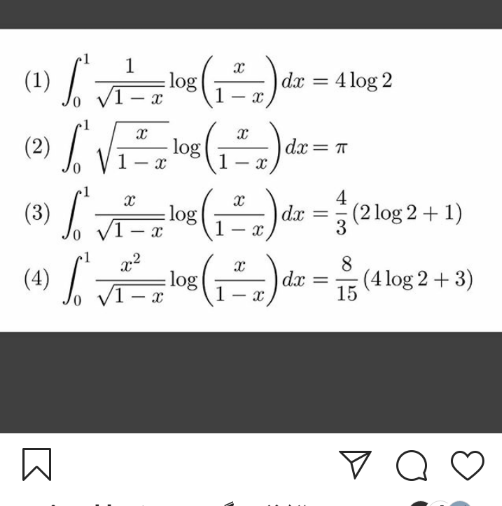Question Number 109377 by bemath last updated on 23/Aug/20

Answered by john santu last updated on 23/Aug/20

$$\:\:\:\frac{\approx\:{JS}\:\approx}{\bigstar\blacksquare\bigstar}\begin{cases}{\mathrm{2}{x}^{\mathrm{2}} +\mathrm{5}{y}^{\mathrm{2}} +\mathrm{4}{xy}\:=\:\mathrm{12}}\\{\mathrm{3}{x}^{\mathrm{2}} +\mathrm{3}{y}^{\mathrm{2}} +\mathrm{3}{xy}\:=\:\mathrm{12}}\end{cases} \\ $$$$\Leftrightarrow\:{x}^{\mathrm{2}} −\mathrm{2}{y}^{\mathrm{2}} −{xy}\:=\:\mathrm{0} \\ $$$$\Rightarrow\left({x}−\mathrm{2}{y}\right)\left({x}+{y}\right)\:=\:\mathrm{0}\: \\ $$$$\begin{cases}{{x}=\mathrm{2}{y}}\\{{x}=−{y}}\end{cases} \\ $$$$\left(\bullet\right)\:{x}=\mathrm{2}{y}\:\Rightarrow\mathrm{4}{y}^{\mathrm{2}} +{y}^{\mathrm{2}} +\mathrm{2}{y}^{\mathrm{2}} =\mathrm{4}\: \\ $$$$\:\:\:\:\:\:\:{y}\:=\:\pm\:\frac{\mathrm{2}}{\mathrm{3}}\Rightarrow\:{x}=\:\pm\frac{\mathrm{4}}{\mathrm{3}} \\ $$$$\left(\bullet\bullet\right){x}=−{y}\:\Rightarrow{y}^{\mathrm{2}} +{y}^{\mathrm{2}} −{y}^{\mathrm{2}} =\mathrm{4} \\ $$$$\:\:\:\:\:\:\:\:{y}\:=\:\pm\mathrm{2}\:\Rightarrow{x}\:=\:\mp\:\mathrm{2}\: \\ $$$${the}\:{solution}\:{set}\:{is}\:\left\{\left(\pm\frac{\mathrm{4}}{\mathrm{3}},\pm\frac{\mathrm{2}}{\mathrm{3}}\right),\left(\mp\mathrm{2},\:\pm\mathrm{2}\:\right)\right\} \\ $$
Commented by bobhans last updated on 23/Aug/20

$$\:\:\:\:\frac{{jooss}−−−−−}{} \\ $$
Commented by bemath last updated on 23/Aug/20

$${cooll} \\ $$
Commented by mnjuly1970 last updated on 23/Aug/20

Commented by mnjuly1970 last updated on 23/Aug/20

$${please}\:{solve}\:: \\ $$
